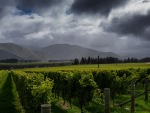New Zealand wine companies can survive, adapt and thrive in the world of Covid-19, says a business advisor in Marlborough.
WK Director Hamish Morrow, who works with the viticulture sector and with wineries, large and small, talks of a “three phase response” to Covid-19, starting with survival. In Marlborough, that’s included a harvest blessed with “sensational” weather, quality fruit, and “exceptional” compliance with regulations, he says. “That has put the industry in a much better position than it might have been.” The relative affordability of Sauvignon Blanc – “by far the biggest line item for our local producers” - has also been a contributing factor to the local industry broadly faring up well at this point, Hamish says.
“From a business point of view, there are varying impacts. We are seeing some wine companies who have a really strong grocery channel have a good lift in sales and demand, domestically and offshore,” Hamish says, while recognising the logistical challenges in getting exports out, as well as the boon of a dropping exchange rate. When Covid-19 first broke out, most people were unable to predict what would happen in any of their markets. “It was very uncertain, and then they saw there’d be a demand spike in grocery channels… That was quickly seen as a strong avenue.”
Meanwhile, those with more restaurant reliance have seen significant softening in demand, and little or no opportunity to enter supermarket avenues once lockdown was in place. But phase two – adapting – has geared up. Some of those companies saw the approaching headwinds, and sold more fruit in response, and many have reacted with boosted direct-to-consumer approaches, he says. “They have really adapted their marketing.” A rise in pandemic parochialism has helped wine companies launch or enhance their online purchase arms. “From what we are seeing that has softened the blow a little bit for boutique wineries.”
Hamish says they have been seeing some delay in payment in some markets, and WK is advising clients to mitigate credit where possible and avoid overexposure to any one customer. They are also recommending companies build a range of scenario plans, given the lack of predictability around the world. That includes budget planning “for a good, bad, ugly scenarios”, he says. “It is hard to predict what revenue levels will be like for the next few years, so you need to be looking at various scenarios, with corresponding strategies up your sleeve.”
On the plus side, he is seeing a lot more connection between companies and customers, as well as greater industry collaboration, thanks to the technology tapped into over lockdown. That includes the likes of virtual tastings, which have been valuable adaptations for the industry. “I don’t think there will be massive growth in sales in the short term, but people may be able to maintain their current levels.”
He is also seeing companies trimming waste from their business, in order to run a leaner ship. That’s not necessarily just about cutting overheads, but might be looking at processes and movement “and where things get stuck process-wise within a business”, says Hamish, emphasising that it’s important to plan and prioritise around efficiencies. “We’re helping a number of clients with business waste removal plans. The key here is having a structured process to reviewing areas of waste and prioritising which aspects to change”, he says. “There’s a tendency to jump to the thing that feels most painful, but that might not give you the biggest bang for your buck.”
When it comes to the third phase – thrive – there is already evidence of companies “taking the opportunity to manage the situation well and come through in a reasonably solid position”, he says. “Globally, the wine industry is in a good place, with a great product offering and a good brand.” Kiwi ingenuity is shining through, he adds. “It’s been cool to see the industry step up and get through in a really challenging time. Broadly, our view is that the industry is in a reasonable place to weather the storm.”














